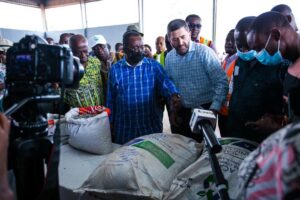- laments fertiliser shortage in sub-region
The Minister for Food and Agriculture, Dr. Owusu Afriyie Akoto, has proposed that farmers adopt Zoomlion’s Integrated Recycling and Compost Plants’ (IRECOP) locally-produced organic compost for their farms to boost crop yields.
He expressed worry over the acute shortage of fertiliser in the sub-region due to the Russia-Ukraine war.
As chairman of the ECOWAS Agricultural Ministers Committee and having chaired two meetings so far, Dr. Afriyie Akoto said there’s a widespread shortage of fertiliser in the sub-region and there is need for action to be taken to reverse the trend.
Dr. Owusu Akoto said based on this shortage, government was quick to adopt the organic fertiliser manufactured and supplied by indigenous Ghanaian companies to solve the fertiliser shortage problem.
 According to the minister, his proposal is not peculiar to Ghana but the entire sub-region since the African market is not doing bad in the production and supply of organic fertiliser made in the form of compost, and urged ECOWAS governments to consider subsidising organic fertiliser for farmers to increase organic food growth against the inorganic food supplies in Africa.
According to the minister, his proposal is not peculiar to Ghana but the entire sub-region since the African market is not doing bad in the production and supply of organic fertiliser made in the form of compost, and urged ECOWAS governments to consider subsidising organic fertiliser for farmers to increase organic food growth against the inorganic food supplies in Africa.
He advised regional, municipal and district agriculture directors and staff to intensify farmer education to focus on the locally manufactured organic fertiliser to increase their produce for more harvest and incomes.
The Food and Agriculture Minister said in furtherance of government’s desire to encourage local fertiliser usage by the farmers, 18 local organic fertiliser producers and suppliers have been identified and encouraged who have applied – and government is currently working on approving them to produce and supply more organic fertiliser to farmers under a subsidised pricing scheme.
Dr. Akoto was interacting with farmers and heads of department at the Regional Coordinating Council in Goaso during his tour of farms and farmer groups in the Ahafo Region on Monday.
He visited the Zoomlion recycling and compost plant, popularly known as IRECOP in Goaso and which is about 80 percent complete, to abreast himself with the seriousness of local fertiliser manufacturers, the Nkaseim Rice Fields and farmer groups, ginger-grower women groups and the Duayaw Nkwanta Medium Prisons Farms, among others.
At the IRECOP, Executive Director of the Environment and Sanitation Processing Plants of the Jospong Group of Companies, Mr. Haidar Said, told the minister and his entourage that the about-US$15million plant will be fully operational in 360 days – when it will receive waste and process it into compost, and also recycle the plastics among others.
He said work is assiduously ongoing in all 16 regions for the IRECOP replication initiative by Zoomlion Ghana Limited, for which the plants are at various stages of completion.
At Duayaw Nkwanta Medium Prison, the minister pointed out that the reasons for high food cost are transportation and world economic indicators – including high cost of fertiliser.
Earlier, President of the Ahafo Traditional Area, Nana Akwasi Bosomprah I, appealed for government to construct a warehouse to assist farmers in the region store their farm produce and avoid them getting rotten on their farms, as is presently the case.
Nana Bosomprah, who is the Goaso Omanhene, expressed a need for government to support farmers – especially rice farmers – in the area with combine-harvesters to harvest their produce for the Planting for Food and Jobs Programme (PFJ) to succeed.










